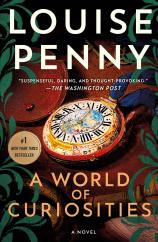A World of Curiosities
Review
A World of Curiosities
A WORLD OF CURIOSITIES, the 18th entry in Louise Penny's Chief Inspector Gamache series, is brilliant and addictive. While it begins slowly as Penny is creating the backstory, that narrative becomes all-important later in the novel when the action and the connections are so fast and furious that it's almost impossible to put the book down.
Chief Inspector Armand Gamache and Jean-Guy Beauvoir originally met over a murder. The siblings involved in that long-ago violence are now in Gamache's hometown, the idyllic village of Three Pines, with its close-knit community. We don't know how much or how little they are responsible for the strange happenings there. When Myrna, the bookstore owner and retired psychologist, is made aware of an extra space in her attic, the citizens of Three Pines are intrigued.
"Can a novel be elegant and beautiful yet horribly violent? Penny achieves that juxtaposition just as she forces us to feel the gamut of human emotions as we read about chilling abuse, psychopaths, and those imperfect people who try to fight for what is right and just."
As longtime fans of Penny know, we expect elegance in her writing, and we certainly are not disappointed. As Myrna ponders the word "temple," which refers to a part of our head, she thinks that it was named by a man --- someone who thought that "the brain was the temple where knowledge was housed." Then Penny writes, "But she knew, as did her companion, as did the dogs, and Gracie, trotting beside them, that anything worth knowing was kept in the heart." The writing is filled with reflection and deep truths about life, especially when it comes to women.
One of the threads that runs through the book is the unfortunate reality of misogyny and how it led to one of the worst tragedies in Canadian history: the Montreal Massacre. On December 6, 1989, a man with a semi-automatic rifle went into a packed classroom at the Polytechnique engineering school, separated the 50 or so men from the women, and told the men to leave. He then went on a shooting spree, killing all the women he could find. The police established a perimeter and didn't enter the building until the gunman shot himself. This horrific event led to the eventual tightening of gun laws thanks to the persistent campaigning of Canadian women who were tired of being treated as lesser humans.
Penny stresses how men's fear of independent, successful and intelligent women leads to violence. She wants us to understand that this fear of "other" is not limited to the past. Hundreds of years ago, women who healed and were educated were called witches and were killed. In 1989, women who wanted to study engineering were called "feminists" and were slaughtered. And today, women who seek control over their bodies and the ability to make their own medical decisions are threatened with punishment.
Anne Lamarque, the founder of Three Pines, was accused of witchcraft. The poet, Ruth, says that the men back then didn't need proof of witchcraft: "All a woman had to be was alive. Just being a woman was, in the church's eyes, evil." When someone argues that there must be a reason, she responds, "Is there a reason gay, lesbian, and transgender people are attacked? Is there a reason Black men are shot? Is there a reason women are raped, abused, refused abortions, groomed and sold as sex slaves?" And centuries later, after the Montreal Massacre, Penny writes of the pushback against making changes to gun laws because some politicians and lawmakers thought it was an isolated incident not reflective of institutionalized misogyny.
We also meet evil of the most depraved kind in this story. Gamache and the others try frantically to solve the puzzle of the contents of the attic, unravel its intent and find the perpetrator before they are all in serious danger. Along the way, the dead bodies are stacking up, and the action becomes more present and of greater urgency. We feel the pressure that Gamache is experiencing, the dire need to act and protect his community and friends. He becomes emotionally distraught over the idea that he has let a madman into his mind and that the killer just might be controlling his every move, putting his family and friends in extreme danger.
Can a novel be elegant and beautiful yet horribly violent? Penny achieves that juxtaposition just as she forces us to feel the gamut of human emotions as we read about chilling abuse, psychopaths, and those imperfect people who try to fight for what is right and just. As I turned the last page, I had mixed emotions. I was satisfied that Gamache had managed to prevail, but I also wanted to go back and reread the whole book to see what clues I had missed about the outcome. I did pick up one or two, but the story is so filled with details and characters that it would take a meticulous reader to catch everything. But what fun trying!
Reviewed by Pamela Kramer on December 1, 2022




